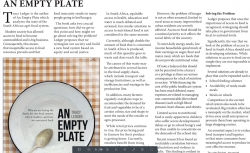An Empty Plate - Tracy Ledger2018-09-18
Tracy Ledger is the author of An Empty Plate which analyses the state of the South African agri-food system.
Modern society has allowed access to food to become commodified and is big business. Consequently, this means that inequitable access to food resources prevails and that food insecurity results in many people going to bed hungry. The book asks two crucial questions: how did we get to this point and how might we go about solving the problem? Ledger proposes that we reimagine our society and build a new food system based on equity and social justice. In South Africa, equitable access to health, education and water is much debated and actioned, but similar attention to access to nutritional food is not considered in the same manner. Currently, although double the amount of food that is consumed in South Africa is produced, much of this quantity goes to waste and does reach the table. The causes of this waste may be attributed to several factors in the food supply chain, which include transport and storage limitations, as well as inefficiencies and wastage in the production line. In addition, many farmers regularly overplant crops to accommodate the demand for fruit and vegetables to be of a certain colour, size and shape to meet the needs of the retailer or agro-processor. While retail prices continue to rise, the price being paid to farmers for their produce is getting lower. Currently, retailers benefit from rising prices while small farmers find it more difficult to survive. Further to this situation, hunger has become a common experience among farm workers and their families who live and work on South Africa's commercial agricultural plantations. However, the problem of hunger is not as often assumed, limited to rural areas as many impoverished urban residents are severely affected. Access to food should be a national priority as it affects the social fabric of the country. To meet daily energy needs, low income households spend much of their earnings on sugar, flour and maize meal, which are foods that do not provide nutritional value. Of note a balanced diet should not be perceived to be a luxury or a privilege as there are serious consequences for a lack of nutrition in society. While financing the cost of the public healthcare system has been much debated, many expenses are related to managing non-communicable (diet related diseases) such as high blood pressure, heart disease, and obesity. Limited access to nutritional food is easily apparent in children who suffer severe developmental delays or go to school hungry and are then unable to concentrate on the demands of the school day. Recent research has found an irrefutable correlation between malnutrition and violence in adults. This finding is evident in the high rate of domestic violence that is present in South Africa. We not only live in a violent society, but one which is marred by skills shortages and constant demand for salary increases to afford food and other necessities. Solving the Problem Ledger proposes that once the importance of access to food is recognised, strategising should take place in government from local to national levels. Significantly, the way that we look at the problem of access to food in South Africa should assist in developing solutions. While solutions to access to food are not simple they are not impossible to implement. Several solutions are already in place that can be expanded such as: School feeding schemes Availability of ready-made meals Meals on wheels Competition in the current retail system also needs to be revaluated. Big retailers often have a monopoly on the market, which drives away small enterprises or prevents them from operating in large shopping centres. An essential aspect is to evaluate food transport and logistics so that more consumers have meaningful access to produce in a cost-effective manner. In conclusion, we must acknowledge that our current food system does not have to be this way. In order to create an equitable society, we need to ensure that all people are included. Access to food is everyone's problem. Back to overview |
An Empty Plate - Tracy Ledger
Copyright © 2026 KwaZulu-Natal Top Business
